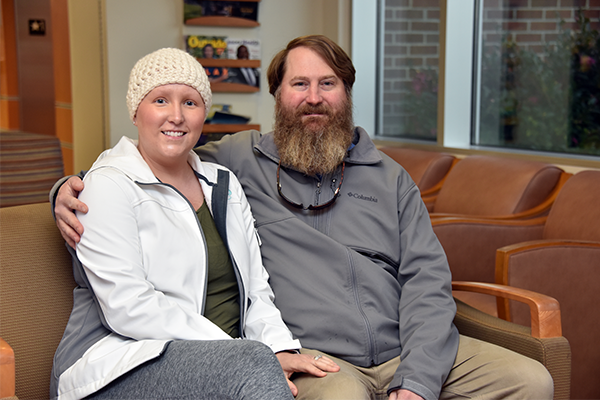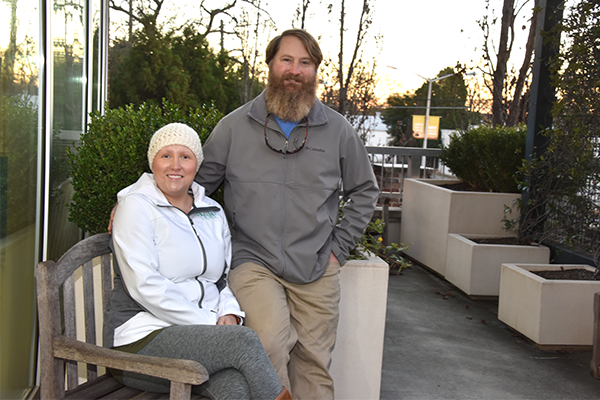Rebekah Griffin is now in the middle of her second fight with cervical cancer despite being young and otherwise healthy. But thanks to a clinical trial at the Georgia Cancer Center, cancer won’t keep her from making memories with her husband and son.
“Cancer does not always mean you’re going to die,” she said. “I’m fighting for my husband, for my son. He’s young and has a long life ahead of him. I’m going to do every single thing I can to be here for every milestone in his life.”
Griffin’s first battle with cervical cancer started with a visit to her gynecologist, in Albany, Georgia, in the summer of 2018. An ultrasound of her abdomen and pelvic area showed a tumor growing on her cervix. It took two biopsies to confirm her fear: stage one cancer.
“While I did feel fear at hearing the word “cancer,” I put my trust in God and trusted his guidance,” she said. “I tried to maintain a positive attitude through every radiation and chemotherapy treatment. You have to stay positive to keep fighting for your life.”
According to the American Cancer Society, around 13,000 women were diagnosed with cervical cancer in 2019. When it comes to early detection the key is to talk with your gynecologist about scheduling recurring Pap smear screenings, which can detect lesions on a woman’s cervix that can become cancerous. Experts also recommend screening for human papilloma virus (HPV), the virus that causes cervical cancer, and urge parents and their children to talk with their doctor about the HPV vaccine.
Griffin said she received the vaccine when she was 18 years old and was receiving regular Pap smear screening prior to her cancer diagnosis.
While the radiation and chemotherapy sessions helped her find remission, the cancer would return in the summer of 2019. It started with unusual leg swelling. At first, Griffin thought it was just a pulled muscle from exercising, but she decided it would be best to get it checked out. Her radiation oncologist decided to do a positron emission tomography (PET) scan and found cancer in a lymph node in her pelvis.
“I followed up with my medical oncologist, Dr. Chirag Jani, in Albany, and he recommended me to Dr. Sharad Ghamande here at the Georgia Cancer Center,” Griffin said. “Dr. Jani told me there may be a clinical trial for recurrent cervical cancer I could qualify for.”
“When cervical cancer comes back, it’s a huge problem,” said Dr. Sharad Ghamande, associate director for clinical trials at the Georgia Cancer Center. “There are not a lot of current treatment options for recurrent disease. This is why clinical trials are so important for cervical cancer patients.”
After answering questions, going through a medical exam and waiting about two weeks, Griffin and her family learned she did qualify for the trial.
“So far, my experience on the clinical trial has been good,” Griffin said. “I do get super tired at times, so I take more naps, but I haven’t been really sick in the days after treatment. And the staff at the cancer center are great to work with when I come in.”
According to Ghamande, there are three reasons why cancer patients should consider enrolling in a clinical trial. First, the simple fact that a patient is considering a clinical trial means they are looking for a treatment option because their previous treatments did not prevent the cancer from entering remission or recurring. Next, the only way to advance treatments for any form of cancer, and to know if they are safe for humans, is through clinical trials. Unfortunately, less than five percent of cancer patients in the United States take part in clinical trials. And finally, if you take part in a clinical trial, you could help discover a treatment that helps future cancer patients. While those patients may be total strangers, they may also be your spouse, family member or friend.
“I want to help myself, but also help future generations of cancer patients,” Griffin said. “I’m young, I’ve got my whole life ahead of me. I’m going to do everything I can to improve my chances of reaching long-term remission. So far, I’m doing well.”






